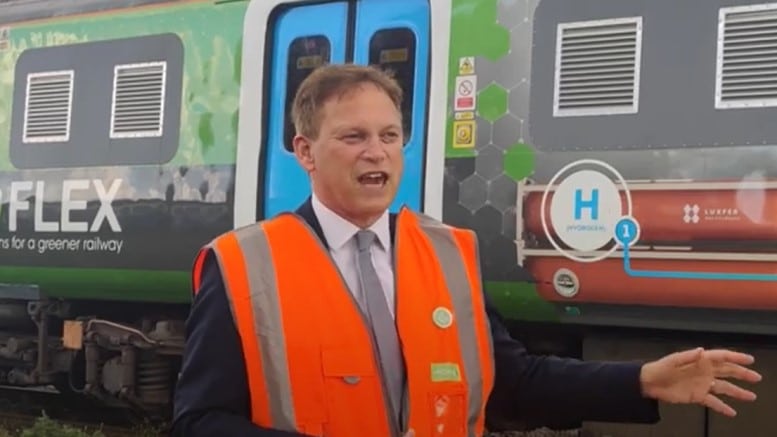
Secretary of State for Transport Grant Shapps has announced that the government has the ambition to develop a trailblazing Hydrogen Transport Hub in the Tees Valley.
Visiting Long Marston in Warwickshire, where the HydroFLEX hydrogen-powered train developed by Porterbrook and the University of Birmingham had its first run on the main line – travelling to Evesham and back – the Transport Secretary outlined government’s desire to bring together representatives from academia, industry and government and drive forward the UK’s plans to embrace the use of hydrogen as an alternative fuel.
Such a move could create hundreds of jobs while seeing the region become a global leader in the green hydrogen sector.

Grant Shapps averred that the Tees Valley is perfectly placed to reap these benefits, following the development there of the world’s largest versatile hydrogen refuelling facility, made possible through government funding.

Secretary of State for Transport.
He said: “As we continue on our road to a green recovery, we know that to really harness the power of transport to improve our country – and to set a global gold standard – we must truly embed change.
“That’s why I’m delighted that through our plans to build back better we are embracing the power of hydrogen and the more sustainable, greener forms of transport it will bring.”
To kick start the development in Tees Valley, the Department for Transport has commissioned a masterplan to understand the feasibility of the hub and how it can accelerate the UK’s ambitions in Hydrogen.
The masterplan, which has been commissioned from Mott MacDonald and is expected to be published in January, will pave the way for exploring how green hydrogen could power buses, HGV, rail, maritime and aviation transport across the UK. The aim would then be for the region to become a global leader in industrial research on the subject of hydrogen as a fuel as well as an R&D hub for hydrogen transport more generally, attracting hundreds of jobs and boosting the local economy in the process.

Through the government’s £23 million Hydrogen for Transport Programme, the plans also include £6.3 million of funding for a green hydrogen refuelling station and 19 hydrogen-powered refuse vehicles in Glasgow, a world-first for the size of the fleet. This will give a post-Covid boost to local economies through the creation of green jobs while also de-carbonising the transport network.


1 Trackback / Pingback